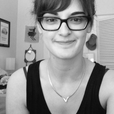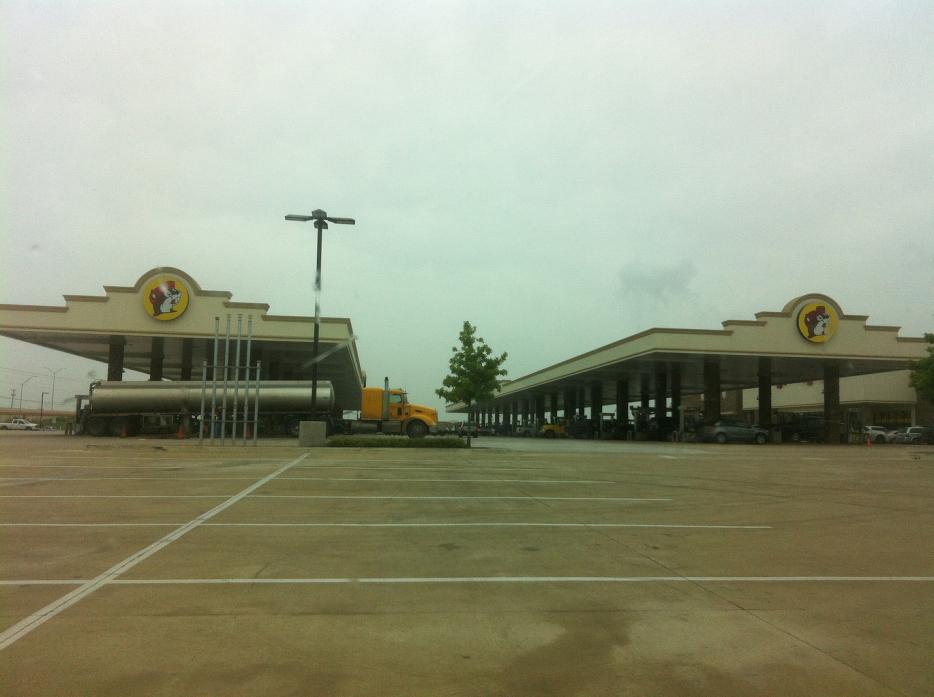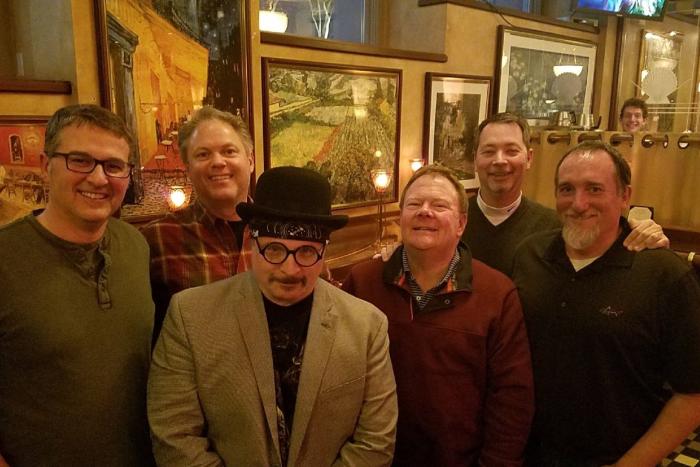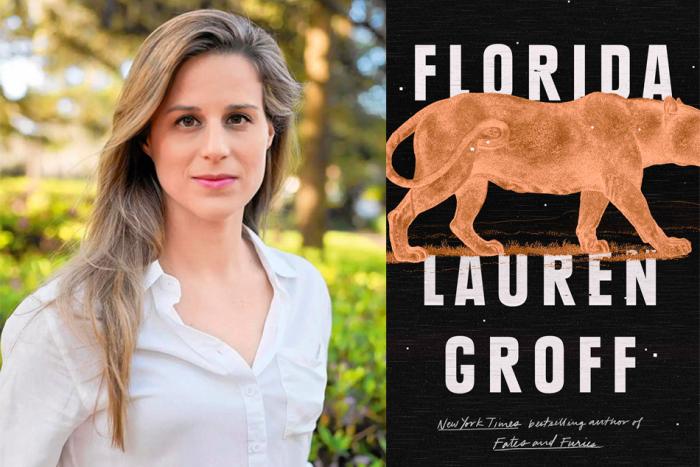On the drive I took from Texas to Chicago in early June of 2017, I stopped at every Buc-ee’s gas station that I saw. Buc-ee’s, a Southern chain, is a place for families and couples, or couples with family-sized appetites: you can wash down your gallon bag of wasabi peas with a cauldron of soda, or stand in line for kolaches the width a newborn. You can buy everything from camo t-shirts to gas grills, boot-shaped earrings to deer feeders. It is the Disneyland of gas stations.
I was twenty-nine, and this was the first road trip I’d taken alone. The drive was onerous—almost sixteen hours, if traffic was kind—but with two duffel-sized bags of Buc-ee’s corn nuggets riding next to me in the passenger seat, nothing short of a four-car pile-up could dampen my good mood. I was off to spend the summer with the boyfriend I’d left behind when I moved to Texas. We’d been together nine years, though we had broken up twice, and there was the hope that this summer might mend us. Then he’d join me for a new life in Dallas, and all our problems would disappear.
But the Midwestern summer meant to reconcile us broke us apart for good, and it was a miserable me that packed up my car and began the slow, hot return trip south. I left Chicago in the early morning. The August sky was the color of ghosts, and I watched as the city I’d once called home faded into the distance. As I crept closer to Texas, the sun—a bright hard cough drop—burned fuller and harsher, and the land began to widen and open up around me.
I was stopped at a Buc-ee’s an hour outside of Dallas when my car battery died. I sat for a while with my hands on the steering wheel, trying to view my life in a positive way, and then I went inside and locked myself in a bathroom stall and cried, and the crying made me feel wonderfully dramatic, my sobs rising above the gushing faucets and flushing toilets. These were the cleanest bathrooms in Texas—everyone said so—and sitting atop a toilet that shone like a dinner plate, mops whipping vigorously beneath stall doors, I had to agree.
I don’t know how much time passed before I finally stood, blew my nose, and flushed. I slid back the lock, its sharp metallic clack echoing off the spotless walls that were covered in glittering rhinestone crucifixes. The air stiffened as heads turned to look at me. At the sinks, I accidentally locked eyes with a little boy. “Look away,” I heard his mother whisper as I passed.
He’s not even supposed to be in here, I wanted to say, but then I caught sight of my reflection in the mirror. I looked tired, distraught, my face a big white dumpling of sadness. I smelled sour, of tears and sweat that leaked through the armpits of my black dress, which was three sizes too large and engulfed me like a garbage bag. My red eyes lowered to the bleach-streaked floor, I hurried out of the bathroom and back into the warm fluorescent buzz.
*
All summer I’d been reading about liminal spaces, and as I wandered the aisles, past long glass coffins of jerky and endless spitting soda fountains and towers of brisket tacos mummified in foil, I felt it—an eerie in-betweenness. To walk around Buc-ee’s as a single, unattached person is to experience your own invisibility. To delight in the Wonka-like array of taffies and trail mixes and gummies stretched floor-to-ceiling, only to realize that nothing—save for salad and hardboiled eggs—is sold in bags smaller than a five-year-old and think Well, I guess if I gave some to my cat, is to wake into your own dashed dreams.
I was alone in the taffy aisle, bleary-eyed with indecision, when I felt the tears starting again, a hot clench deep in my guts. I left without buying anything.
Outside men were pumping gas. They looked like the men I’d always imagined lived in Texas, button-down shirts, dirty hands, pick-up trucks. I wiped my eyes and walked over to one.
“Excuse me,” I said. When he turned from the pump, I saw that he was tall, with a face as strong as a brick. He looked like a man who would know how to fix something broken.
“My car died. Can you jump me?” I said.
His teeth, when he smiled, were broad and clean and made me shiver, though it must have been at least one hundred degrees outside. As I led him to my car, his boots clicking on the hot pavement, I thought of the psychic.
It was my senior prom’s after party. She was the mom of somebody, and I remembered how she’d gripped my hand tight in her wrinkled one, palm up, and told me I would marry a cowboy from Texas. It came back to me as I watched this man lift the hood of my car and stick his head inside, his shirt tightening around the muscles in his back.
“So do you live around here?” I asked.
“Madisonville,” he said into the car’s belly. When I said nothing, he looked up, at the streak of blankness in my eyes.
“You’re not from here.” It seemed an accusation, the way he pointed a jumper cable at my chest. I shook my head no.
He grinned and said, “I knew it,” and I wondered what had given me away—the red square glasses that ate up half my face, maybe, which I wore to compensate for the drama I felt my features lacked. Or maybe my hair, the firm, organized bun jutting from the top of my head as if trying to catch a space signal.
I leaned against my car, which was attached to this man’s truck with the cables, and he walked over and stood in front of me.
“Jimmy,” he said, extending a calloused hand. I’ve always had a thing for crusty-looking men, and that’s what attracted me to this guy—the sense that he’d been roughed around. His tired cheeks and desolate eyes struck me as a welcome relief from the aggressive cheer in Buc-ee’s. We were kindred spirits in malaise.
He asked where I was from and I said Chicago.
“No shit!” Jimmy looked at me in a surprised, impressed way. From his pocket he pulled out his phone and handed it to me; on the screen was a note he’d titled “Thirtieth Birthday Bucket List.” I scrolled through: see a play, ride bikes in a charity race, go to Chicago, read a Shakespeare novel.
Novel.
Jimmy was grinning at me, but I couldn’t bring myself to look at him. With horror I thought of my literature students, of how I was always crossing out story and writing ESSAY! in red pen on their papers. I needed to loosen up, I thought, to stop being so “exacting.” That was what my ex-boyfriend had called me. He’d thrown in “uptight” while he was at it, and the sting I’d felt only confirmed my worst suspicion: it was true.
Against our backs my car hummed softly. Jimmy’s truck made violent gasping noises as it worked to power mine. He had a job in a warehouse, he said, doing something with machines. A fire at Christmas had burned all the hair off his knuckles and forearms. A few months before that, a forklift accident had shattered every bone in his right foot. This only restored my attraction to him. My ex-boyfriend had worked behind a desk. Who’s uptight now? I thought, eyeing Jimmy. I imagined those strong arms wrapping around me and carrying me into a new life.
Jimmy asked what had brought me to Texas and I told him I was a professor.
“No shit,” he said again—this time in a flat voice. He narrowed his eyes at me. “You’re young to be a professor.”
“I’m the same age as you,” I said.
“You think you’re smarter than me?” Jimmy’s voice was teasing, but his face wore a scowl.
“Clearly not,” I said, gesturing to my dead car and trying to laugh, but Jimmy just stared at me. A minute of silence passed, my heart thudding, before he took my keys and turned them in the ignition; with a shudder, my car roared to life.
“Well, thanks again,” I said as Jimmy handed me back my keys. I started to slide behind the wheel when I felt his hand on my arm.
“Gotta let ‘er run a minute,” he said. The grin was back, pinned high like mistletoe. “I’m gonna get a sandwich. You want one?”
“Uh, sure,” I said. I don’t know why he kept talking to me, or why I let him; even now, almost a year later, it embarrasses me to think of it. But my breakup had made me believe that something big could happen. I needed to leave my comfort zone, friends were telling me—hang out at restaurants and bars and strangers’ apartments. Put my face on the Internet!
Still, I couldn’t shake the suspicion that there was something Jimmy and I recognized in each other, some desperation, maybe, that brought him walking back across the parking lot toward me, two massive, plastic-wrapped, pulled pork sandwiches in hand. Without a word he climbed into his truck and motioned for me to sit next to him. After I turned off my car and we settled in, he reached into the glove compartment and withdrew a small glass pipe.
“You smoke weed?” he asked.
I didn’t, not really—something that, according to my ex-boyfriend, had contributed to my uptightness. But out here, over one thousand miles from home and surrounded by open space, it felt possible to be a different kind of person. My nerves were jangly, bright, as if I’d been plugged into an electrical socket, yet still I managed to accept the pipe and hold the lighter to the bowl. Looking through the window, I could see the sign with Buc-ee’s face—a beaming, chubby-cheeked beaver in a red baseball hat—and beyond that fields and fields and fields, all flat and brown as beer. In Chicago I’d felt cradled by the buildings, hidden; but here in Texas I felt exposed, that I would need to be brave.
We chewed in silence.
“Do you think we can turn on the radio?” I asked.
“You got it, lady.”
It was he who brought up the subject of sex. One minute, I was asking him about his dogs’ personalities and the next thing I knew he was telling me about his ex-wife, who’d cheated on him. “A cock tease,” he called her. “A whore.” Jimmy also told me that she’d been an English teacher, like me, and that she’d slept with the entire high school—he was certain of it. “It’s like, one night she’s cooking you dinner and the next she’s swallowing some seventeen year-old’s dick. You know?”
“Oh, sure.”
I bit into my sandwich and looked out the window. On the sign, Buc-ee’s grin seemed suddenly sinister, his huge white teeth like two gleaming cleavers in his mouth. I stared at him as the pot dug its warm fingers into my brain. A minute of silence and then Jimmy relit the pipe, took a hit, and passed it my way.
“You have a boyfriend?’
“Yeah,” I said. “I mean no. Not anymore.”
“You guys get into fights?”
“Like, arguments?’
“No,” he said. “Fights. With your fists.”
I lit the pipe and thought of the spat I’d had with my ex-boyfriend before I’d left. It was the first time either of us had gotten physical during an argument, and it left me feeling like a complete idiot. I’d gone to shove him, but had tripped on the leg of a kitchen chair and fallen into the table, bruising my hip. Even our fights weren’t working, we’d laugh-cried later, as he helped me carry boxes to my car.
But Jimmy didn’t care. The topic had only been raised as a transition, an excuse for him to brag about demolition derby. On weekends he drove for a local team, Orange Crush. “There’re always fights,” he said excitedly. “Hell, I’ve even seen husbands and wives up in the stands, just slugging it out.”
“But don’t they stop the races?” I asked. “That’s insane. I mean, what is this, Mad Max or something?”
“You should come see for yourself,” Jimmy said. “This weekend.”
“I can’t,” I lied. “I have a work thing.”
Jimmy rolled his eyes. “Women,” he said, blowing smoke out of his nose. “Y’all the same.” He passed me the pipe, but when I peeked at him I saw that his eyes didn’t hold the anger that his voice did. He just seemed sad to me, and tired. “Look at us,” he said, letting out a long sigh. “A couple of dumped fucking assholes.”
I wanted to defend myself, or at least point out that I had done the dumping, not the other way around, but then there came a tap on the driver’s side window. “Fuck off,” said Jimmy, waving his hand. The man outside did not fuck off. He wore a red polo t-shirt with Buc-ee’s grinning face emblazoned on the left breast pocket, and on the right, a plastic tag that said Manager. Jimmy rolled down the window. There was no use denying anything: the truck reeked of weed.
I guess the manager could have gotten us into trouble—called the police, had us ticketed for loitering or something—but instead he just told us to get lost. Jimmy and I parted without saying goodbye, me walking off to my car, and he heading, I assumed, toward home. I watched his truck pull out of the parking lot. Whatever allure he’d possessed had vanished, and now he was just another broken man in a truck, trying to make the day pass.
*
I went back into Buc-ee’s. Inside, it smelled of barbecue and cleaning agents, a mopped school cafeteria. The mood was buzzy, animated, teeming with parents and children, their eyes wild and fingers dripping soda. A group of pre-teen boys rushed past me, waving wooden popguns. I watched them dart and fire at each other across shelves of camo hats.
In front of the men’s bathroom stood a handful of women, waiting. One, a short brunette whose silhouette, in loose denim overalls, looked as shapeless as a kolache gave me a hard look before I realized I’d been staring. I walked past them to the coolers, grabbed a water bottle the heft of a ten-pound weight, paid, and went back outside, into the close heat. In my car, I drank the water and waited out the high. I shoveled corn nuggets into my mouth and wondered what might have happened had I accepted Jimmy’s offer. I pictured our house overlooking a wide front yard: the charming wrap-around porch, his truck parked in our winding dirt driveway.
When you’re young, it’s easy to believe in more, the idea that there is always something—or someone—better waiting for you. Instead of a filmmaker in Chicago, it might be a painter in Los Angeles or maybe even a cowboy in Texas. You tell yourself that you moved to Dallas for a teaching job, and that you could keep on doing this, year after year—another university, another city—because you think there will always be a job, a city, a someone for you. Until the day you wind up in a Buc-ee’s gas station, so lonely that you spend your afternoon flirting with a divorced demolition derby driver.
I’d always heard the sky is bigger in Texas. But as I looked out my window I wondered if this was really true or just something I needed to believe in, all that boundless blue. Outside, people were filing in and out of Buc-ee’s, their smiles gummy and eyes overfull, arms loaded down with more than they could carry. You don’t just go to Buc-ee’s to get your desires met. You go to Buc-ee’s for the same reason you break up with someone: to pursue possibility, that narcotic promise of more. It’s a faulty promise, maybe, but what else to do besides pretend and buy more corn nuggets?
But that understanding would come later. At Buc-ee’s, there were one hundred gas pumps. Walls of candy. The cleanest bathrooms. And shining above it all, a beaver’s impossibly white smile and the words, Hold It. You Can Wait.






